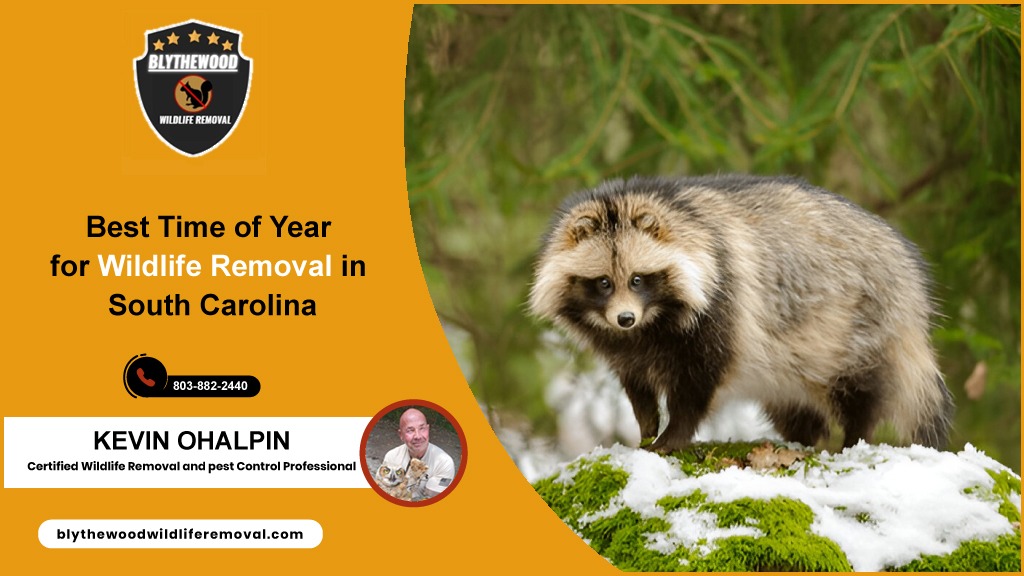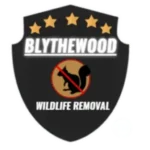
The Hidden Dangers of Having Bats in Your Home in South Carolina
September 17, 2025
Best Time of Year for Wildlife Removal in South Carolina
November 18, 2025South Carolina homeowners frequently face the challenge of wild animals nesting in their attics. From raccoons and squirrels to bats and snakes, attics offer warmth and safety for animals, but for humans, this uninvited presence often brings health hazards, property damage, and sleepless nights. The good news is that there are humane ways to remove animals from your attic that are safe, effective, and legal. This guide explores how to do it the right way.
Why Choose Humane Wildlife Removal?
The goal of humane removal is to resolve conflicts with wildlife in a way that protects both the homeowner and the animal. In South Carolina, certain species like bats are protected under state and federal law, meaning you cannot harm or kill them. But beyond legality, there is an ethical reason to avoid harmful methods like poisoning or lethal traps. These approaches often result in painful animal deaths, lingering carcasses in inaccessible areas, and an increased risk of disease transmission.
Using humane strategies ensures that the animal is removed without injury or stress, and that the problem does not return.
Identifying the Animal in Your Attic

Not all attic invaders behave the same. Hearing noises during the night typically points to nocturnal creatures like raccoons, rats, or opossums. Activity during the day might suggest squirrels or birds. The sounds themselves also vary; scurrying, scratching, thumping, or high-pitched squeaks may indicate different animals.
Visual signs such as droppings, nesting materials, chewed wires, and damaged insulation also help identify the species. Raccoons are known for tearing apart vents and soffits. Squirrels tend to chew holes near the roof edges. Bats leave behind guano and oily smudges at entry points. Identifying the species is essential because each one requires a tailored, species-specific removal strategy.
Step-by-Step Process of Humane Attic Wildlife Removal
The first step is a full inspection of your attic and exterior roofline. This involves locating all entry and exit points, identifying nests, and evaluating any damage caused by the animals. It’s critical not to seal any holes until you are certain that all animals have been evicted, or you risk trapping them inside.
In most cases, a professional will install a one-way exclusion device at the animal’s main exit point. These devices allow the animal to leave but prevent it from returning. Over the course of a few days, the animal naturally exits for food or water and becomes locked out. Once you’re confident that all occupants have left, the entry points are permanently sealed using durable materials like metal mesh, which cannot be chewed or clawed through.
If there are young animals, especially in spring and summer, it’s important to wait until they’re old enough to leave with the mother. Removing a mother and leaving babies behind causes them to starve, die, and decompose, which not only causes terrible odors but also undermines the humane approach entirely. In such cases, ethical professionals will either wait or perform a gentle hand-removal and reunification process outside the attic.
Species-Specific Approaches and Legal Considerations
Each species requires different handling techniques, and many are protected by local or federal law. For instance, raccoons are a common attic intruder in the Midlands region. If you suspect raccoons in your home, a licensed team specializing in raccoon removal in South Carolina can safely trap and relocate them according to legal requirements.
Bats, often found in large numbers, cannot be trapped or killed. Instead, professionals install bat valves, specialized one-way devices that allow bats to leave but not return. Since bats are protected under federal conservation laws, it’s illegal to remove them during their maternity season. Proper bat and guano removal in Columbia, SC, includes a detailed cleanup process, as bat droppings can harbor harmful fungi.
Squirrels and rodents are notorious for chewing through insulation and wiring, increasing the risk of attic fires. Removing them humanely involves a combination of exclusion, live trapping, and entry-point sealing. Professional squirrel removal services in Columbia also focus on preventing re-entry and addressing potential attractants around your property.
For snakes and reptiles, removal must be handled with extreme care. Some snakes in South Carolina are venomous and must be dealt with by experts. If you’ve encountered a snake in your attic, contacting a snake or reptile removal specialist is the safest choice.
Why DIY Solutions Often Fail

Many homeowners try to handle attic wildlife problems themselves, often with poor results. Over-the-counter traps can injure animals and may be illegal to use without a license. Poison is not only cruel but also dangerous for pets and children, and it rarely addresses the root of the problem, entry points, and nesting behavior. DIY exclusion without knowing the full layout of the attic or wildlife laws often results in trapped, suffering animals or repeat invasions.
Hiring a humane wildlife removal service ensures that the job is done correctly the first time. Teams trained in animal behavior, structural inspection, and legal compliance are far more likely to deliver a long-term solution rather than a short-term fix.
Aftercare: Cleaning, Sanitizing, and Prevention
Once animals have been removed, it’s essential to sanitize the attic. Wildlife often leave behind urine, feces, parasites, and damaged insulation. These materials not only smell but also carry health risks such as histoplasmosis, leptospirosis, and hantavirus. A full cleanup often includes HEPA vacuuming, antimicrobial treatments, and insulation replacement.
To prevent future infestations, professionals will recommend sealing potential entry points, trimming tree limbs away from the roofline, and securing garbage or pet food sources around the home. Some may even offer annual maintenance plans or inspections to ensure your attic remains animal-free.
Choose Ethical, Effective Wildlife Removal in South Carolina
If you’re looking for a safe and lasting way to deal with animals in your attic, make sure you’re working with a team that specializes in humane wildlife removal and understands the legal and biological nuances of each species. At Blythewood Wildlife Removal, we proudly serve Columbia and surrounding areas with compassionate, licensed solutions that protect your home while respecting wildlife.
Our experts handle everything from bat removal to raccoons, squirrels, opossums, snakes, and rodents, using only humane methods and legal best practices. With our full-service approach, including exclusion, cleanup, and prevention, we don’t just remove the problem; we solve it permanently.
If you suspect animals in your attic, take action now before the problem worsens. Call us at 1-803-760-9166 for urgent removal or to book an inspection.
- How to Tell if Bats Are Living in Your Attic in South Carolina - December 24, 2025
- Removing Raccoons Safely From the Attic in South Carolina - December 24, 2025
- How to Keep Squirrels Out of Your Attic in Columbia - December 24, 2025





